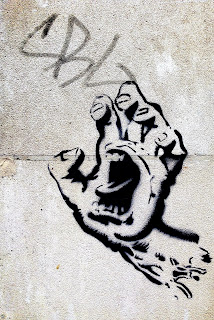Confession, Rationalization, or Both?
Wednesday, December 04, 2019
A very common defense of religion is that it forms the basis of morality, and that we would be reduced to anarchic mayhem without it.
Given that practically the first words out of the mouths of such defenders usually spell out real-world consequences for a lack of ethical guidance, this defense strikes me as more psychological than philosophical. Regarding the latter: Wouldn't such a problem as societal collapse absent morality support (at least considering) the idea that there is a secular, rational, life-serving role for morality? Indeed, wouldn't such consequences call for greater thought about morality than, say, jotting down a list of rules to be taken on faith and calling it a day?
This is a commonly-professed view, though, which means that many people accept it by default, without really thinking about it. For many of those people, the response has an element of fear, partly from genuine (but misplaced) concern, and partly from the unknown: This is something that many people find difficult to think about, in great part cause it also causes them to feel guilt. Guilt -- most of it unearned -- is the dominant emotion aroused by the dominant form of morality in our culture, altruism. No wonder most people dislike such discussions!
Much of the time, I take this objection as a confession that one hasn't given the question much thought, but at least values morality for life-affirming reasons.
But what of those who aren't merely startled/grasping at the conventional wisdom? What of those who actually see this package deal -- of serious consequences from (actually) immoral behavior, with a school of morality divorced from this-worldly happiness -- as persuasive? If pressed, they will attempt to argue that reason does not apply to moral questions. But the fact is that they hope to frighten you away from that line of thought. That alone speaks volumes.
That said, such people will not abandon reason so much as attempt to pervert it, a process Ayn Rand, the American novelist and advocate of egoism, called rationalization:
I recommend reading the rest of the passage at the immediately preceding link.Since an emotion is experienced as an immediate primary, but is, in fact, a complex, derivative sum, it permits men to practice one of the ugliest of psychological phenomena: rationalization. Rationalization is a cover-up, a process of providing one's emotions with a false identity, of giving them spurious explanations and justifications -- in order to hide one's motives, not just from others, but primarily from oneself. The price of rationalizing is the hampering, the distortion and, ultimately, the destruction of one's cognitive faculty. Rationalization is a process not of perceiving reality, but of attempting to make reality fit one's emotions.
Image by Heather M. Edwards, via Unsplash, license.
Philosophical catch phrases are handy means of rationalization. They are quoted, repeated and perpetuated in order to justify feelings which men are unwilling to admit. [bold added]
Rand ends with the following insight: "[E]vil philosophies are systems of rationalization." A corollary: The more effort an individual invests in trying to twist reality into fitting with one's emotions, the uglier the emotions. Rationalization is a confession of a very different thing than complacence.
-- CAV


No comments:
Post a Comment